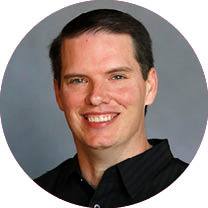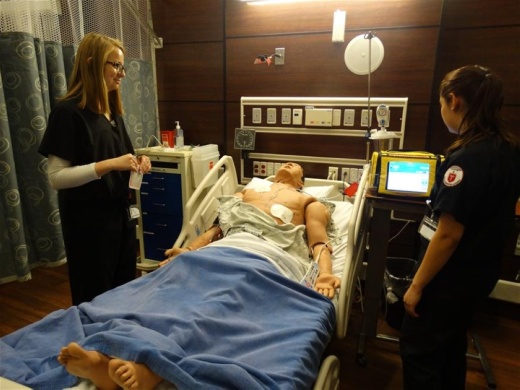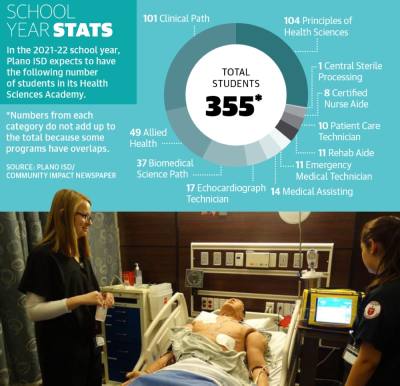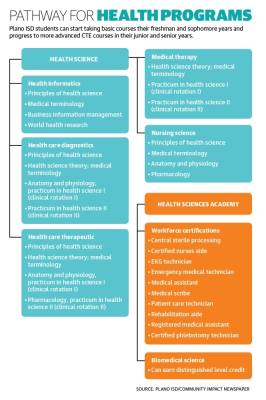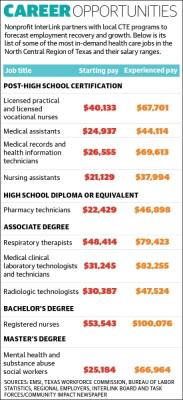The PISD Health Sciences Academy will add medical assisting and medical scribe programs that begin in 11th grade, CTE Director Karen Buechman said. And the high school health science program will offer a patient care tech certification for students.
Students who enroll in either track have a chance during high school to care for patients at hospitals and nursing homes, Buechman said.
“Our goal is to provide hands-on learning opportunities so that our graduates possess the skills and knowledge that enable them to be future-ready citizens and leaders in the global workforce,” Buechman said via email.
Dr. Katie Choy is the regional director of nursing professional development, wound care and vascular access team at Baylor Scott & White-Centennial in Frisco. She called the PISD students she has worked with “remarkable.”
“Most of the time, you wait until you get to college and do your clinical practicum,” Choy said of other parts of the country. “The opportunity for high school students to come to clinicals and apply what they’ve learned in school at the same time ... is what makes it so unique and such a strong program.”
Providing a pathway
The academy is a four-year program that students enter in ninth grade at Williams High School and continue at Plano East Senior High School. The academy offers two options for students, Buechman said. One allows them to earn college credits from Collin College. The other option offers students the opportunity to study the science behind the medical industry. In the health science CTE program, PISD students can choose from five different fields of study. In these programs, students gain experience by taking part in clinical rotations at local medical facilities.
Four different medical certifications are available through PISD. The district’s dual-credit opportunities can lead to students potentially graduating from college sooner. Students can also earn an associate degree in applied science from Collin College before graduating high school.
Collin College’s Health Professions Program has more than tripled in student size over the last four years, according to department Director Juli Westcott.
The department offers five academic tracks for students pursuing certificates and/or occupational skills awards. Westcott said students often finish some of these programs within a semester while waiting to get into some other health care program.
“I see it as the foundation for their future—the doorway to their careers,” Westcott said.
The certified nurse assistant track is the department’s most popular program with nearly 500 students, Westcott said. However, as demand has grown for phlebotomy technicians in the workforce, she said that track has led to students getting offered jobs. Westcott said the field sees a “fairly high turnover” rate if people are not well-trained.
“You’re not going to have as much time as you think you would in nursing school to learn how to draw blood well,” Westcott said. “And we’ve all had someone draw blood from us that did not know what they were doing.”
Gaining experience
Each certification offered through PISD has its own set of requirements. And students can do more than one certification if their schedule allows.
The health science program’s new patient care tech certification includes training for certified nurse assistant, echocardiograph tech and more.
The district’s new medical assisting program will give students the chance to earn certifications for several fields, Buechman said.
When taking part in clinical rotations at hospitals, students get hands-on experience handling simple tasks.
The pursuit of a health care profession is often sparked by an early love of science, according to McDermott Scholar Yilong Peng, who graduated from The University of Texas at Dallas in May.
“It was going into high school and starting to take courses in biology, and chemistry especially, that really opened my eyes to this wide field of science,” Peng said. “From there, students choose if they want to do more of an academic path [or] more of a practical path, and then all the caveats and nuances that come with each.”
Isabella Scuilla got into Frisco ISD’s CTE program after enjoying the health science courses in high school. She graduated this spring from Reedy High School with two certifications in health care.
During the fall, Scuilla and other FISD students worked on the telemetry floor and the oncology floor at Baylor Scott & White Medical Center-Plano to put their nursing assistant certifications to use.
“It was just a really good learning experience because ... they actually let us help,” Scuilla said.
Benefits of certifications
Students can discover new career paths through the district’s offerings, Buechman said.
“It will expose them to health care careers that they have not heard about,” she said.
One such career students can learn about at Collin College is its surgical assisting program.
“Every time you turn out a surgeon, you turn out a need for a surgical assistant,” program Director Donna R. Smith said.
Short of medical school, Smith said her program is the only other way students can get their “hands dirty” and help perform a surgery.
“A physician, to be a well-trained surgeon, is going to spend probably $1 million, whereas you could probably spend a total of $8,000 to be a surgical assistant, and that’s including your surgical technology degree and certificate,” Smith said.
While COVID-19 disrupted some of the learning opportunities for students in PISD and FISD, it also deteriorated the pipeline of workers joining the health care field, according to Ken Hutchenrider, president of Methodist Richardson Medical Center.
“By being able to expose people to health care [through] programs that we have set up with [local school districts], we think that people will have a much stronger view of what health care is,” Hutchenrider said. “We’ll be able to work through this, but there will be a temporary dip.”
Britt Berrett, who is director of the bachelor’s degree program in health care management at UTD’s Naveen Jindal School of Management, estimated COVID-19 has caused a delay of 15-18 months for that pipeline of future health care workers.
However, Berrett said that gap can be overcome. He said he has already seen an uptick in nursing students training in hospitals and clinics.
“[The pandemic] has actually elevated the awareness of the importance of caregivers,” he said. “I’m working with students who want to do good. They want to be part of something bigger. I think that this is a catalyst for new entry into the health care space.”


